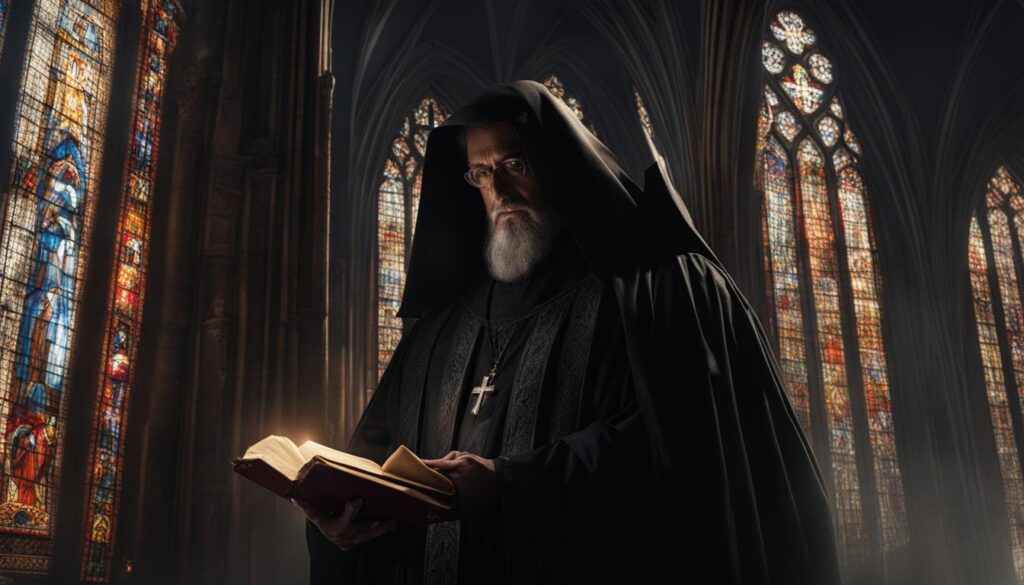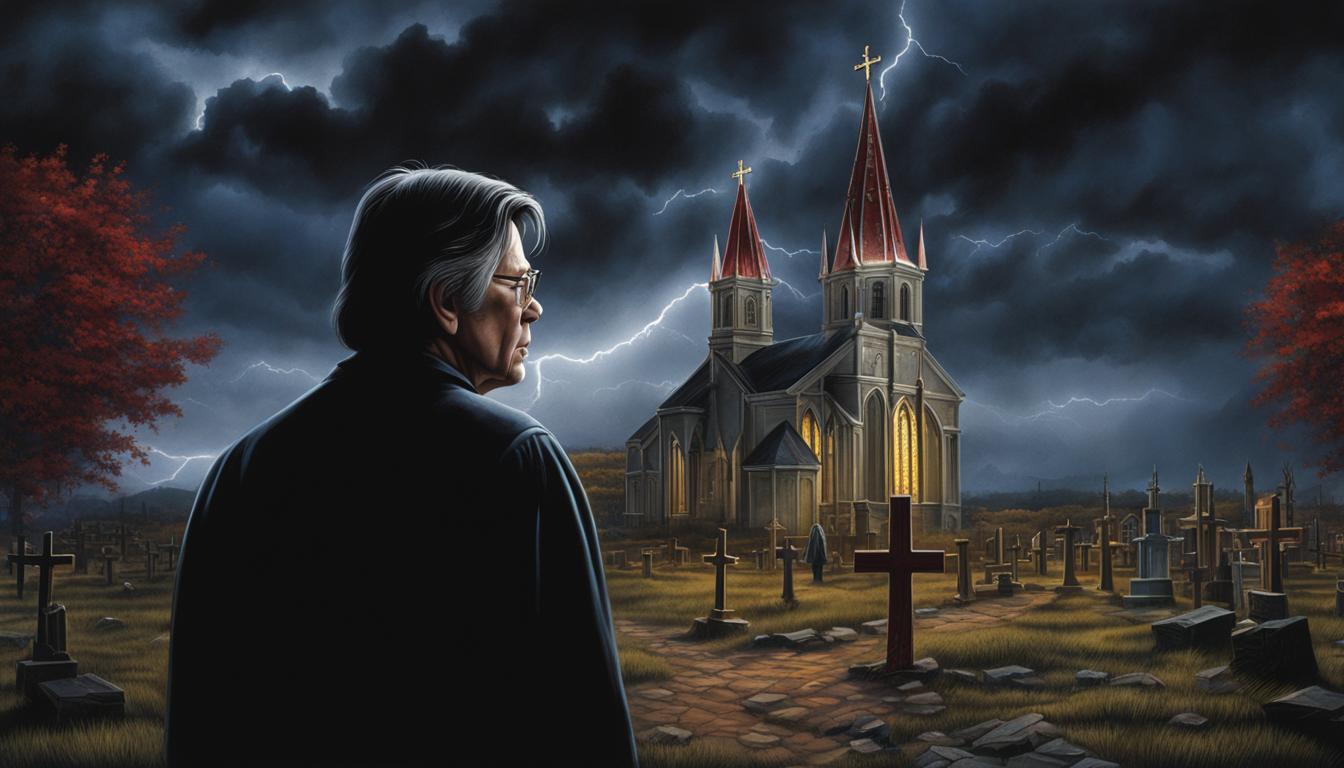Stephen King is a renowned author who has captivated readers for decades with his horror and suspense novels. However, his works also explore deeper themes, particularly religion, which provide insightful perspectives into the human experience. King’s use of religion in literature is both thought-provoking and intriguing, as he weaves religious themes into his narratives in unique and impactful ways.
Key Takeaways
- Stephen King’s exploration of religion in literature is both thought-provoking and intriguing.
- King weaves religious themes into his narratives in unique and impactful ways.
- Religion serves a significant purpose in King’s writing, as he uses it to explore deeper themes and provide insightful perspectives into the human experience.
- King’s use of religious symbolism in his horror novels is particularly noteworthy, adding deeper psychological meaning to his stories.
- Through his exploration of religion, King challenges readers to reflect on their own beliefs, values, and the human condition.
The Role of Religion in Stephen King’s Early Works
Stephen King’s early works were marked by a distinct fascination with religious themes and symbolism. Some of his earliest stories, such as “Carrie” and “Salem’s Lot,” featured religious characters and explored their beliefs and practices.
For example, in “Salem’s Lot,” Father Callahan is a central character whose faith is tested when he confronts the supernatural. King uses his character to explore the role of religion in confronting evil and to show the moral complexities of belief systems.
In addition to characters, King also uses religious symbolism to create an ominous atmosphere and instill a sense of foreboding. In “Carrie,” the prom that serves as the climactic scene is held in a church, heightening the dramatic tension and symbolically representing the forces of good and evil in conflict.
Ultimately, King’s early works demonstrate his interest in exploring faith and belief systems as a way to understand human nature and confront the mysteries of the universe. His use of religious themes adds an additional layer of complexity to his storytelling, making his early works some of the most captivating and thought-provoking in his literary canon.
Religious Symbolism in Stephen King’s Horror Novels
Stephen King’s horror novels are known for their gripping and vivid storytelling, often delving into darker themes such as death, fear, and the supernatural. A key element of his writing is the use of religious symbolism, which adds layers of meaning and complexity to his narratives.
One of the most striking examples is his novel “Carrie,” which features a telekinetic girl raised by a fanatically religious mother. The story is laced with biblical allusions, such as the concept of blood as a symbol of sin and the righteous punishment of the wicked. The prom massacre can be interpreted as a metaphorical reenactment of the biblical story of Sodom and Gomorrah.
It is another novel that employs religious symbolism, as the evil entity that terrorizes the town of Derry, Maine takes on the form of a clown named Pennywise. The clown, with its red hair and white face, can be seen as a twisted version of Jesus, especially given its ability to transform into a crucified form in the book’s climactic battle. This raises interesting questions about the nature of evil and the power of belief.
Other novels, such as The Stand and Salem’s Lot, also feature prominent religious symbolism, exploring themes of divine intervention and redemption in the face of evil. These symbols often serve to heighten the tension and suspense in the story, creating an unsettling atmosphere of psychological horror.
Overall, Stephen King’s use of religious symbolism in his horror novels is a testament to his skill as a writer and his ability to create complex and layered narratives. By incorporating religious themes and iconography into his stories, he adds depth and resonance to his characters and makes his readers confront their deepest fears and beliefs.
Stephen King’s Exploration of Good vs. Evil through Religion
Stephen King is a master of horror, and his exploration of the eternal battle between good and evil through religion is a recurring theme in his works. King uses religious concepts and archetypes to create complex moral dilemmas that challenge readers to reflect on their own beliefs and values.
In The Stand, for instance, King populates a post-apocalyptic world with characters who embody religious tropes, from the demonic Randall Flagg to the saintly Mother Abigail. The novel presents a stark dichotomy between good and evil, with religious symbolism playing a prominent role.
In other works, King uses religion as a prism through which to explore the nature of evil. In Salem’s Lot, for example, the vampire Barlow is depicted as a demonic force that corrupts the town’s religious leaders and institutions. By framing evil in religious terms, King heightens its sense of horror and significance.
“For the religious among us, every act of evil is a reminder of the eternal conflict between good and evil.”
The Dark Tower series is perhaps King’s most ambitious exploration of the intersection between religion and good vs. evil. The novels are rife with religious symbolism and allusions, from the Christian themes of sacrifice and redemption to the Buddhist concept of ka-tet. King uses these concepts to construct a vast, multi-dimensional universe in which the fate of all existence hangs in the balance.
Overall, Stephen King’s exploration of good vs. evil through religion adds a layer of complexity and depth to his storytelling. By using religious concepts and archetypes, King challenges readers to consider profound existential questions and moral dilemmas.
The Influence of Christianity in Stephen King’s Works
Stephen King’s works have been influenced by Christian beliefs and themes throughout his career as a writer. One of the most prominent examples is in the novel Desperation, where King explores the concept of redemption through the character of Collie Entragian, a cop who becomes possessed by an evil entity. Collie’s redemption is portrayed as being tied to his acceptance of Jesus Christ as his savior and the ultimate triumph of good over evil.
Another example is in The Stand, where the survivors of a devastating pandemic are divided into two factions, one led by Mother Abagail, a spiritual figure who represents Christian values and morality, and the other led by Randall Flagg, a demonic figure who embodies sin and temptation. The novel explores the battle for the souls of humanity and how one’s faith can determine their ultimate fate.
King’s use of Christian symbolism and themes is not limited to his horror works. In the novel Rita Hayworth and Shawshank Redemption, the character of Andy Dufresne represents a Christ-like figure who suffers unjustly but ultimately triumphs over his oppressors. Similarly, in The Green Mile, John Coffey’s miraculous healing powers are described as being bestowed upon him by God, highlighting the power of faith and divine intervention in the face of injustice.
The influence of Christianity on King’s works is significant, as it highlights the moral and religious underpinnings of his storytelling. His use of Christian elements adds depth and complexity to his characters and themes, making his works more resonant with readers who share similar beliefs and values.

Other Religions and Spiritual Practices in Stephen King’s Stories
Stephen King is known for his ability to incorporate various religions and spiritual practices into his stories, which adds an extra layer of complexity to his narratives. In addition to Christian symbolism and themes, King draws inspiration from other religious traditions such as Buddhism and Native American spirituality to create a diverse and multifaceted world in his works.
For instance, in The Shining, King references Buddhism through the character Dick Hallorann, a chef who has the psychic ability to “shine”. When explaining his powers to young Danny Torrance, Dick compares their abilities to Buddhist practices of “seeing” and “knowing”.
In Desperation, King explores Native American spirituality through the character of Tom Billingsley, a geologist who has a deep connection to the land and its spirits. Tom’s beliefs and practices clash with the demonic entity Tak, who embodies destruction and chaos.
King’s use of various religious and spiritual practices not only enriches the world of his stories but also challenges readers to consider different perspectives and ways of understanding the world around them.
Stephen King’s Critique of Organized Religion
Stephen King’s literary works often challenge organized religion and its influence on individuals and society. His stories are rife with examples of corrupt and hypocritical religious figures, highlighting the dangers of blindly following institutionalized faith. King critiques the dogma and authority of these religious institutions and raises important ethical questions about their practices.
“The trust of the innocent is the liar’s most useful tool”, King once wrote in The Talisman, warning of the power that corrupt individuals hold over their followers.
King’s critique of organized religion is not limited to any one faith. He is quick to point out issues in Christianity, Islam, and other religions. His stories often feature characters who struggle with their religious beliefs and face conflicts with religious institutions.
Through his storytelling, King encourages readers to question religious authority and to seek their own understanding of faith and spirituality. He challenges readers to confront the darker aspects of organized religion and their role in perpetuating societal issues such as discrimination and exclusion.
King’s criticisms of organized religion have sparked controversy and debate over the years, but they have also opened up important conversations about the role of faith in our lives and society. His unique perspective on religion and spirituality has left a lasting impact on readers and continues to resonate with audiences today.
The Existential and Moral Questions Raised by Stephen King’s Religious Themes
Stephen King’s exploration of religion in literature not only provides readers with a tense and thrilling plot but raises fundamental questions about the human experience. His works prompt readers to delve deeper into the nature of faith, morality, and existence.
Through his portrayal of religious characters, symbols, and themes, King invites readers to reflect on their own beliefs and values. He challenges his audience to consider difficult and often uncomfortable questions about the world around them. For example, King’s novel, The Stand, raises the question: if God is powerful and benevolent, why does He allow evil to exist?
In addition to addressing theological concerns, King’s works also delve into more secular philosophical questions about morality and ethics. For instance, many of his stories feature characters facing moral dilemmas, asking them what they would do in the same position. This encourages readers to consider their own ethical beliefs and the choices they would make in similar situations.
Overall, Stephen King’s exploration of religion in literature allows readers to confront fundamental questions about the human experience. By challenging readers’ beliefs and values, King’s stories prompt reflection on the nature of existence itself.
Legacy and Significance of Stephen King’s Exploration of Religion
Stephen King’s exploration of religion in literature has left an indelible mark on the genre. His ability to seamlessly integrate religious themes and concepts into his storytelling has made him a unique voice in contemporary literature.
King’s works have not only entertained readers but also provoked thought and discussion on issues of faith, morality, and the human condition. His portrayal of religion has been instrumental in highlighting its complexities and contradictions, and its role in shaping individuals and societies.
The significance of King’s exploration of religion lies in his ability to weave together different religious traditions and spiritual practices to create new meanings and interpretations. His works reflect a deep understanding of religious history and mythology, and the universal human experience of grappling with existential questions and moral dilemmas.
King’s legacy as a writer who has explored religion in literature is unparalleled. His works have influenced popular culture and have inspired numerous other writers to incorporate religious themes in their storytelling.
As the literary world continues to evolve, King’s exploration of religion will undoubtedly remain a significant contribution to the genre, providing readers with a unique perspective on faith, belief, and the human experience.



